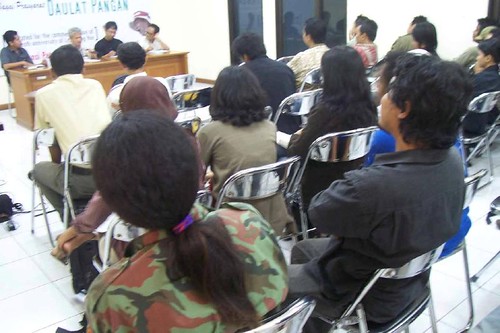API Reflection-Discussion Forum dedicated for 5th Commemoration of Lee Kyung Hae

By Loji Hady, API
Jakarta, Indonesia (12 Sep 2008) — In line with 5th year of the death of Lee Kyung Hae, a South Korean Farmer who committed suicide in Cancun, Mexico during the Ministerial Meeting of WTO in 2003, API held a reflection-discussion at National Commission on Human Rights (Komnas HAM) office in Jakarta on September 10, 2008. “Agrarian Reform as a Precondition of Food Sovereignty” was the theme of the reflection-discussion.
Fifty participants from many civil organizations such as Agra, SPP, and Pergerakan attended the discussion, while NGOs such as Bina Desa, SPI, KPA, Walhi, IGJ, Elsam, PBHI, and Sawit Watch also sent their representatives to participate in the event; National Commission on Human Rights and students participated as well. But none of politicians who were invited to the discussion came. Some indicated that it is obvious that recently some politicians seem not sensitive to respond crucial issues of the nation.
The discussion started with video clip presentation of the movement against liberalization of agriculture and the death of Lee Kyung Hae in Cancun, which subsequently followed by the commemoration ceremony of Lee, then video presentation with theme of state and corporations violence on Langkat peasants (API’s member in North Sumatra Province).
Mr. Gunawan Wiradi, one of the resource persons at the discussion stated that agrarian problem is the most complicated issue since it involves many stakeholders where the role of military is very urgent to be considered.
“To achieve the agrarian reform, slowly we need to include military to participate,” Mr. Wiradi said. “Military is a key actor during the independence struggle era long time ago. When we were at the guerilla, peasants provided the army free foods for nine months in the villages while the state in disadvantages!”.
The senior lecturer also criticized the ineffectiveness role of National Commission on Human Rights. According to Mr. Wiradi, National Commission on Human Rights has been handling the agrarian conflicts slowly for one case solved another case comes. The violence against peasants still keeps going on many places. Then he suspected that there is a political interest intricate in such agrarian cases.
Mr. Jhoni Simanjuntak, a commissioner of National Commission on Human Rights who handle the violence cases against peasants then subsequently responded the statement mentioned. “We are not slow in dealing with the case by case. But we have to thoroughly think and strategize the way we solve the problems more comprehensively,” the commissioner explained. “It’s also been our consideration at the Commission. It is the situation on location that demanded us to handle the problem case by case. This doesn’t mean that the Commission doesn’t have vision in solving the problems within a grand framework and with efficient way”.
Mr. Saiful Bahari, other resource person, elaborated that agrarian conflicts cannot be separated from the form and character of power and political economic system that has been developing so far. There is a lack of attention on the agrarian cases and its relationship with the tendency to politic that need to be a profound assessment. Most attention concentrates on the case resolution and not in the grand framework of the case itself and the relationship with political map tend as well.
“I encourage all of us to put the agrarian reform movement on the broad and contextual perspective,” Mr. Saiful Bahari added. “We need a clear movement blueprint. Without the change on the character of power in the middle of such neoliberalism recently, we can’t operate the movement”.
Agustiana, the Secretary General of Petani Pasundan who came later added that the more aggressive of the police involved in agrarian cases is very obvious. The police are now in the position of facing the peasants directly in the fields, violating them while eagerly protecting the interests of corporations. Agustiana stated that the National Agrarian Reform Program as a confusing problem.
“Does the police institution have nothing else to do or they are playing a certain mindset?” Agustiana said. “This institution seems to be afraid of nothing. They do violence against peasants over and over. In many land conflicts there have been so many wrong people detained. National Commission on Human Rights has to be firmed on this situation. It should not only use the media in the process, but should ask for legitimate of Indonesian peasants’ movement. Not only giving the violators punishment at media level, but it also has to punish them politically and juristically”.
The discussion got more interesting in gaining the feedback from the floor. The participants were mostly interested in discussing strategy in handling agrarian cases, and criticized the measures taken in the fields and experienced by peasants. They hope in the future agrarian reform networking will stronger and synergy; therefore it will strengthen bargaining position of peasants struggle at power level and at political economic policy system of the nation.
The discussion ended with break the fasting of all participants, continued by informal discussion on the plan of agrarian reform networking meeting that will be held next day at Walhi office in Jakarta. The meeting will invite several peasants’ organizations and NGOs.
(Published in Bahasa at www.aliansi-petani-indonesia.org and www.api-indonesia.co.cc. Translated into English by Ika Krishnayanti, Bina Desa)



Comments are closed